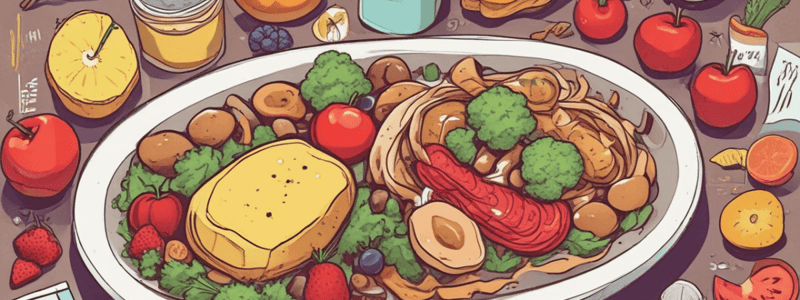Podcast
Questions and Answers
What percentage of total energy from carbohydrates is recommended in a nutritionally adequate diet?
What percentage of total energy from carbohydrates is recommended in a nutritionally adequate diet?
45 to 65%
What is the primary source of carbohydrates in the diets of people in developing nations?
What is the primary source of carbohydrates in the diets of people in developing nations?
Relatively unprocessed carbohydrates from whole grains, beans, potatoes, corn, and other starchy vegetables
What is the average percentage of calories from carbohydrates in the typical diet of adult Americans?
What is the average percentage of calories from carbohydrates in the typical diet of adult Americans?
About 46%
What is the recommended daily limit of added sugars in a 2000 kcal/day diet?
What is the recommended daily limit of added sugars in a 2000 kcal/day diet?
How many teaspoons of added sugars does the average American consume per day?
How many teaspoons of added sugars does the average American consume per day?
What is the approximate energy contribution of added sugars in a 2000 kcal/day diet?
What is the approximate energy contribution of added sugars in a 2000 kcal/day diet?
How much added sugar is in a 12-ounce can of cola-flavored, sugar-sweetened soft drink?
How much added sugar is in a 12-ounce can of cola-flavored, sugar-sweetened soft drink?
How many kilocalories does each gram of sugar supply?
How many kilocalories does each gram of sugar supply?
What percentage of daily limit for the intake of added sugars is met by drinking one can of cola for a person who needs 2000 kcal daily?
What percentage of daily limit for the intake of added sugars is met by drinking one can of cola for a person who needs 2000 kcal daily?
What do 100% fruit juices, unlike colas and other soft drinks, contribute to the diet?
What do 100% fruit juices, unlike colas and other soft drinks, contribute to the diet?
What are the main sources of added sugars in Americans’ diets?
What are the main sources of added sugars in Americans’ diets?
What is a recommended replacement for soft drinks according to Food & Nutrition tips?
What is a recommended replacement for soft drinks according to Food & Nutrition tips?
What type of fruit products often contain added sugars and only 10% fruit juice?
What type of fruit products often contain added sugars and only 10% fruit juice?
What nutrient do most fruits contain in abundance compared to pastries or chips?
What nutrient do most fruits contain in abundance compared to pastries or chips?
Where are you likely to find high amounts of unhealthy carbohydrates according to the text?
Where are you likely to find high amounts of unhealthy carbohydrates according to the text?
What is a recommended way to prepare healthy and portable snacks according to the text?
What is a recommended way to prepare healthy and portable snacks according to the text?
Flashcards are hidden until you start studying
Study Notes
Carbohydrate Consumption Patterns
- In industrialized nations, people tend to eat more highly refined starches and added sugars, whereas in developing nations, diets are largely based on unprocessed carbohydrates, such as whole grains, beans, potatoes, and starchy vegetables.
- Nutritionally adequate diets should provide 45-65% of total energy from carbohydrates.
- The typical diet of adult Americans supplies about 46% of calories from carbohydrates, with a significant portion coming from added sugars.
Added Sugars in American Diets
- Added sugars are sources of empty calories, with the average American consuming about 22 teaspoons (almost 18% of daily energy) per day, exceeding the recommended daily limit of 12 teaspoons (200 kcal) for a 2000 kcal diet.
- A 12-ounce can of cola-flavored soft drink contains about 37g of added sugar, contributing to 150 kcal of added sugars (three-quarters of the daily limit).
- Main sources of added sugars in Americans' diets include sugar-sweetened beverages, snacks, and "sweets".
Reducing Added Sugar Consumption
- Practical ways to reduce added sugar consumption include:
- Replacing soft drinks with plain water or infused water
- Making carbonated drinks with 100% fruit juice and club soda
- Reading labels for juice content and avoiding "fruit drinks" with added sugars
- Preparing portable, nutritious snacks, such as fresh fruit and vegetables, to replace processed snacks
- Choosing whole, unprocessed foods, like fruits, over processed snacks, like pastries or chips
Studying That Suits You
Use AI to generate personalized quizzes and flashcards to suit your learning preferences.




